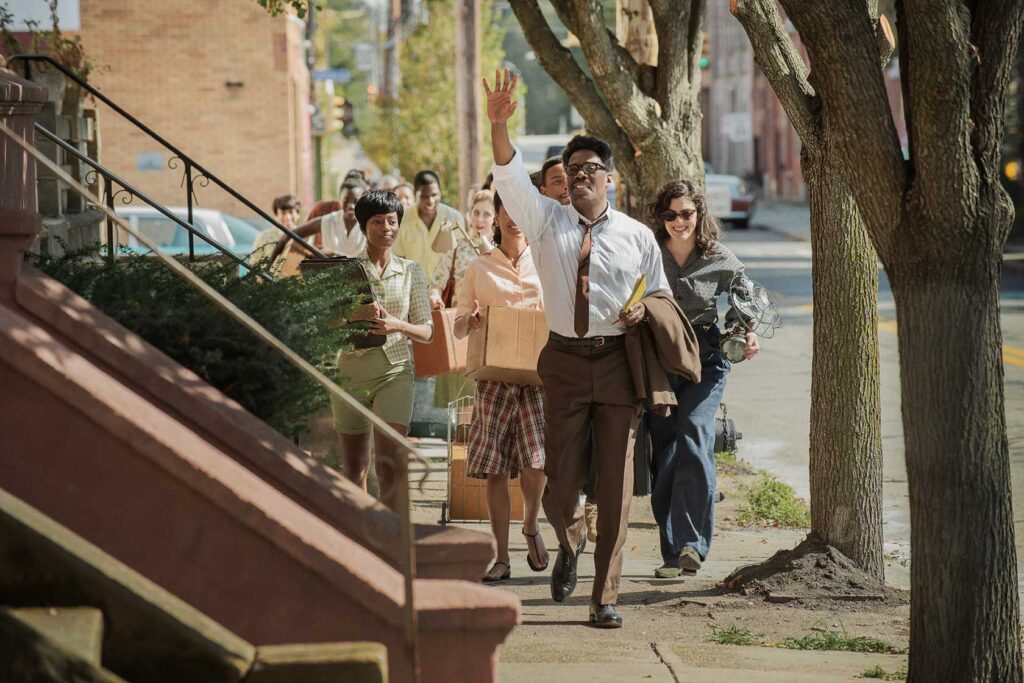
If you’ve ever participated in a mass protest in Washington, D.C. or any gathering for social change, you have Bayard Rustin to thank.
Or even if you haven’t.
Rustin’s role as the chief organizer of the nation-changing 1963 March on Washington — a direct inspiration for dozens of mass protests since, from the Million Man March in 1995 to the Women’s March at the start of the Trump administration — is chronicled in the biopic “Rustin,” now streaming on Netflix. It’s directed by George C. Wolfe (Ma Rainey’s “Black Bottom”) and stars a very likely Oscar-bound Colman Domingo in the title role. Executive producers are Barack and Michelle Obama, themselves historical figures and fittingly so because the film is as much a history lesson as it is entertainment.
That history centers around Rustin’s role organizing what was then the largest mass gathering at the nation’s capital, most famous as the setting of the “I Have a Dream” speech of the Rev. Martin Luther King, Jr. (Aml Ameen). Officially, Rustin was only the march’s deputy director, relegated to the role because Harlem’s Black Congressman Adam Clayton Powell (Jeffrey Wright) and NAACP head Roy Wilkins (Chris Rock) adamantly refused to bestow the director title to a gay Black Quaker pacifist who once belonged to the Young Communist League.
Instead, Powell and Wilkins convince the civil rights leaders co-sponsoring the march to name A. Phillip Randolph (Glynn Turman) as its titular head. A venerable Black labor leader, Randolph had planned a similar march demanding Black civil rights in 1941 — called off with just days to go when President Roosevelt issued an executive order desegregating the defense industries on the eve of World War II. Rustin had been Randolph’s assistant then, and when Randloph was tapped to lead the 1963 march (which, mind you, was Rustin’s idea) he picked his protégé as deputy again — with the understanding that title or not, Rustin would be the one running the show.
Much of the action centers on the march’s Harlem war room populated by Rustin’s own idealistic yet pragmatic young protégés. Among them is Rachelle Horowitz (Lilli Kay) drafted as the march’s transportation coordinator despite her protest, “I can’t even drive!”
The beehive of activity in the march’s headquarters is interspersed with sub-plots involving the intrigue necessary to keep the movement leaders on board and a side issue of Rustin’s sexual dalliances. Perhaps in the filmmakers’ effort to exhibit Rustin’s commitment to racial equality both politically and personally, one of his liaisons is Black and the other white. Elias (Johnny Ramey) is a composite of a Black preacher on the down-low. Tom (Gus Halper) is based on real-life activist Tom Kahn, with whom Rustin did have a relationship.
Most of the other characters are based on real people, but there is one anachronism: The planners kick off their work with a party, dancing to “Shotgun” by Junior Walker and the All Stars — released in real life in 1965, two years after the march.
The film also focuses on Rustin’s close friendship with King, whom Rustin advised during the Montgomery Bus Boycott of 1955-57 and afterward. Despite Powell’s incessant threats to “expose” the two, there was nothing sexual to expose, with Rustin wisecracking, “He’s not my type.”
In lines like that, juxtaposed with pure planning genius (“Do not kill an impulse before it is born,” Rustin tells his “angelic troublemakers” in a brainstorming session) Domingo nails one of the most complex political figures of the 20th century. My assessment comes from more than casual movie-going; as a documentarian of the Civil Rights Movement, I’ve perused thousands of Rustin’s writings, photos, film, voice and music recordings, and even his doodles over the past three decades — though I forget at times that I never met the man.
“We basically ended up with a film that was true to his mission and his character,” Walter Naegle, Rustin’s surviving partner from the last decade of his life, told me by phone from the New York apartment he shared with Rustin and where he still lives.
Naegle served as an advisor to the film, as did President Obama and Horowitz, the young transportation coordinator for the ’63 march. For its 60th anniversary last summer, she recalled the moment she knew it would be a success.
“We were aiming at 100,000,” she told me of attendance estimates. “About a week before the march I concluded that we were going to have about 89,000.”
Rustin conveyed those numbers to Wilkins, she said, “And Wilkins said, ‘Hot damn! We’re going way over 100 (thousand)!” — because Horowitz’s count didn’t include people like Wilkins’ Aunt Bessie who would come to the march at the last minute.
To this day, Horowitz said, “I don’t know if he really had an Aunt Bessie” — but a multitude of aunts, cousins and others indeed showed up.
That anecdote made it into the film — with Wilkins’ real or fictitious relative shortened to “Aunt Bess.”
“When you talk about making a film about organizing a demonstration, it sounds about as exciting as watching paint dry. But it depends on who’s doing the organizing. And in this case, it was somebody who was dynamic and charismatic and full of life and inspiring. That’s what makes the film.”
Not bad for a deputy director.






